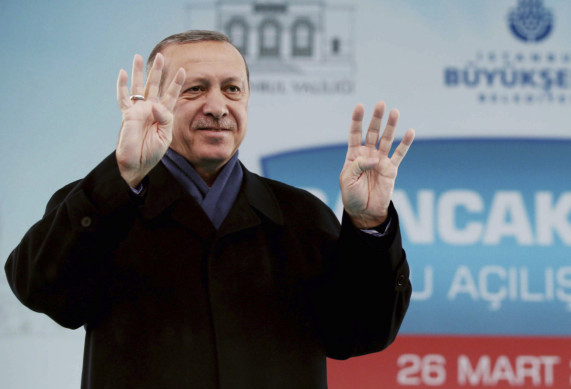
While the European Union tries to weather a nationalist storm that threatens its core institutions, some of its most important strategic allies have injected more uncertainty into the current political climate. A clear example is Turkey, which has been a Nato member state since 1952, and an official candidate to join the EU since 1999. On paper, Turkey looks like an ideal country to serve as a bridge between Europe and the Middle East. But it has now taken an alarming turn away from Europe, with President Recep Tayyip Erdogan even accusing the German and Dutch governments of acting like Nazis.
Since withstanding an attempted coup last July, Erdogan has taken advantage of a national state of emergency to go on the offensive and shore up his power. A surge in popularity has buttressed his new strategy of governing by decree. So far, more than 100,000 civil servants have been fired or suspended, and many of Erdogan’s political rivals have been jailed. Numerous civil-society organisations and news outlets have been shut down, and Turkey now holds the dubious honour of having a record-breaking number of journalists behind bars.
Moreover, Erdogan is pressing for a constitutional reform, to be decided by a referendum in mid-April, that would move Turkey from a parliamentary to a presidential system. If the reform passes, Erdogan will acquire powers exceeding even those held by Mustafa Kemal Ataturk, the venerated “father” of modern Turkey.
The Council of Europe has warned that the referendum vote could lack integrity, because it is being held under a state of emergency. In these circumstances, a reform of this magnitude would be another blow to Turkish democracy, with Erdogan gaining even more latitude to pursue his increasingly wayward foreign policy.
Notwithstanding a March 2016 agreement between Turkey and the EU to manage the flow of refugees entering Europe, diplomatic tension seems to be the new normal for the bilateral relationship. A few weeks ago, German Chancellor Angela Merkel criticised Erdogan for his attacks on press freedom; and Erdogan, for his part, dangerously trivialised Nazism in his comments criticising the cancellation of pro-referendum rallies, due to security concerns, in Germany and the Netherlands.
But Erdogan cannot hide behind the refugee agreement to issue such unacceptable insults. While it would be counterproductive to respond to anger with more anger, the EU does need to send a clear message that its partnership with Turkey is highly valuable, but not unconditional. The recent joint statement by EU High Representative Federica Mogherini and Commissioner Johannes Hahn — calling on Turkey “to refrain from excessive statements and actions” — is a welcome start.
The growing tensions between Turkey and the EU have coincided with other important changes in Turkey’s foreign policy. After Turkey downed a Russian warplane in November 2015, Erdogan reconciled with Russian President Vladimir Putin surprisingly quickly. Turkey then started to cooperate with Russia in the war in Syria, and intervened militarily in the conflict in August 2016. The long-term viability of the incipient Russian-Turkish alliance is questionable, but it has undoubtedly yielded results on the ground in Syria.
One of Turkey’s main objectives in Syria is to defeat Daesh (the self-proclaimed Islamic State of Iraq and the Levant), which has launched numerous terrorist attacks on Turkish soil. But the Turkish government also hopes to prevent the establishment of an independent Kurdistan that could project its influence into south-east Turkey.
To this end, the Turkish authorities are targeting the Democratic Union Party (PYD), claiming that it is linked to the Kurdistan Workers’ Party (PKK), which the United States, the EU, and Erdogan all consider to be a terrorist group. But the US and the EU are concerned about Turkey’s attacks against the PYD, given its central role in pushing back Daesh. So far, President Donald Trump’s administration has shown no willingness to withdraw US support from the PYD.
Geopolitical uncertainty
The Kurdish question is a long-standing source of geopolitical uncertainty in the region. In light of this, the US and the EU must keep pressure on Erdogan to pursue sensible priorities with which everyone agrees — namely, ending Daesh’s barbarism. Achieving this goal will require a coalition that is both as inclusive as possible and capable of taking Raqqa, Daesh’s stronghold in Syria.
Despite Erdogan’s growing hostility, the EU should not hesitate to defend its ties with Turkey, or to remind Turkey that the relationship has been mutually beneficial. After all, Turkey’s 1995 customs-union agreement with the EU has contributed substantially to its economic development.
Strains in the Turkey-EU relationship may persist until peace is restored in Syria; but they are not necessarily irreversible. A number of steps would help ease the tension. Turkey’s government should adopt a less erratic foreign policy and allow citizens to express themselves freely in the upcoming referendum and other future votes. The EU, for its part, should hold steady, and maintain its commitment to the idea of a stable, pluralistic Turkey — one that allows its citizens’ dynamism to shine.
— Project Syndicate, 2017
Javier Solana was EU High Representative for Foreign and Security Policy, Secretary-General of Nato, and Foreign Minister of Spain. He is currently President of the ESADE Center for Global Economy and Geopolitics and Distinguished Fellow at the Brookings Institution.










